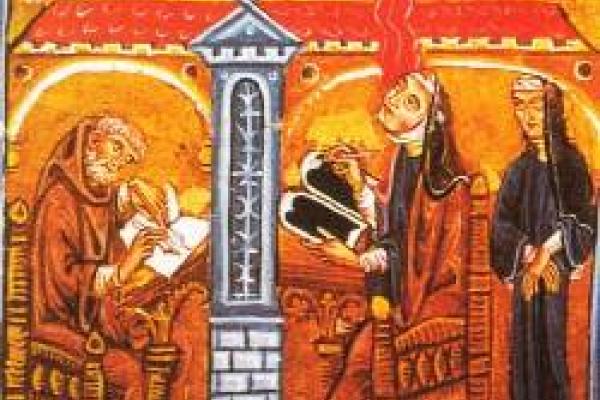
The School of Music welcomes guest lecturer Dr. Michael Klaper, professor of musicology at University of Jena, Germany. Klaper presents "The visionary chants of Hildegard of Bingen: Observations on their genesis, function, and reception."
The Benedictine nun Hildegard of Bingen (1098-1179) was not only a prolific author of visionary as well as hagiographic works, letters, and scientific writings, but also the composer of more than 70 chants and a religious play, the Ordo virtutum. Her vast musical output is mainly transmitted in two contemporaneous manuscripts which have been studied in some detail in the past. There also exist numerous literary documents from the 12th century that speak of her musical activities, though they have not yet gained the attention they merit. This lecture explores how these documents can contribute to a better understanding of the genesis and the specific nature of Hildegard’s compositions.
Michael Klaper studied musicology, medieval German literature, and art history at the universities of Tübingen and Erlangen (Germany). After having achieved his doctorate in 2002 with a thesis on the musical history of the Benedictine abbey Reichenau (at the Lake of Constance) in the 10th and 11th centuries, for which he received an award, he worked as associate professor at the Institute of Musicology in Erlangen. From 2007 onward he was general editor of the Monumenta monodica medii aevi. In 2008 he completed his Habilitation with a collection of studies dedicated to the history of the Italian opera in France during the 17th century. In 2010 he was appointed full professor of musicology at the University of Jena (Germany) and has been teaching since then at the Institute of Musicology Weimar-Jena. Since the same year he is a corresponding member of the Society for Seventeenth Century Music. His main research interests are the music history of pre-modern Europe (ca. 800-1500) as well as the musical theatre in the Baroque era. Currently he is preparing, together with Barbara Nestola, a database concerning all the theatrical pieces with substantial parts sung in Italian that were performed in 17th-century France.
This event is free and open to the public.
Upcoming Musicology Events
